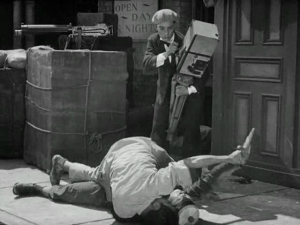 There’s a friendly rivalry – at least in retrospect – between Buster Keaton and Charlie Chaplin. Who is the greatest silent clown? Is it the sweet and genial Little Tramp, or the great Stoneface, equally small and lithe and seemingly always behind the eight ball? Every time I watch a Chaplin film, I’m convinced that it must be Chaplin. But today, I think that Keaton has the edge. Because I finally watched The Cameraman.
There’s a friendly rivalry – at least in retrospect – between Buster Keaton and Charlie Chaplin. Who is the greatest silent clown? Is it the sweet and genial Little Tramp, or the great Stoneface, equally small and lithe and seemingly always behind the eight ball? Every time I watch a Chaplin film, I’m convinced that it must be Chaplin. But today, I think that Keaton has the edge. Because I finally watched The Cameraman.
In contrast to his acknowledged masterpiece The General, Keaton’s The Cameraman is a smaller film, less heavy on the sight gags and insane stunts, and far more reliant on the gentle nature of his protagonist as he attempts to impress a pretty girl. But it’s also a story of art and moviemaking, of what constitutes ‘good’ cinema. Where Sherlock Jr. gave us cinema as narrative magic, The Cameraman gives us cinema verite.
The plot could be just about any Keaton (or Chaplin) film: the scrappy little fellow meets a girl, is smitten and immediately sets about trying to win her heart. In this case, the way to do that seems to be to become a newsreel cameraman. Naturally enough, this sets up all the gags we might expect: Keaton attempts to film a Yankees game, only to arrive at an empty stadium. Never one to be outdone, he plays the game himself, acting as pitcher, batter, umpire and fielders. Then he tries to film a Tong war with hilarious results that include the near destruction of his camera and his friendship with a monkey. There are other sketches too: Keaton attempts to change his clothes in a swimming pool dressing room also occupied by another, much larger fellow – watch that one closely, because old Stoneface actually cracks up several times; he loses his bathing suit and must obtain another one; displaced from a bus with his lady love, the old boy rides on the side instead. As with all Keaton gags, the physical comedy is meticulously constructed, such that we’re almost bored by the seemingly meaningless set-up. Then the gag hits and the man’s true genius – all that build up, for a moment of exceptional acrobatic hilarity – comes through.
The Cameraman is much more than the sum of its gags, however. The love story, often secondary in Keaton’s work, comes forward. Never have I cheered so heartily for the little guy. His sweetness, and the girl’s apparent disregard for his qualities, is heartbreaking. His attempts to win her have a tentative nature, though. She really isn’t callous, nor does she fail to understand him; she simply is uncertain of what she wants. It’s a complex narrative, and one that evinces a much deeper contemplation of human relationships than usually seen in silent comedies.

Keaton’s musings on his own art also impress. The cameraman’s failure to produce ‘usable’ newsreel footage at first is complicated by the quality of what he does produce. Simply by accident he overlaps frames of a battleship and Broadway, spools a swimmer diving backwards, and creates a pandemonium of traffic in spliced together footage. These are scenes that are not only hilarious; they would be welcome in European arthouse films of the same period. But that’s not what newsreel is about, and the cameraman finally learns where the demands of his profession lie. The footage he takes of the Tong war is GOOD; intense, close-up scenes of mob violence and knife fights. Throughout the film, we watch a director directing himself, then see the footage that he produces. Few contemporary musings on the nature of the cinema art come so directly, and poignantly, to the point.
What Keaton has done with The Cameraman is to draw a parallel between the different forms of cinema, from camera tricks and manipulation to the ability of movies to present reality. It is a movie that finally convinces the girl that she was wrong about him. His native understanding of what constitutes good cinema gets him his job. The cameraman will never be rewarded with a ticker-tape parade, but as far as Keaton is concerned, he should be. In the end, it is cinema, in all its forms, that tells the inherent truth.


